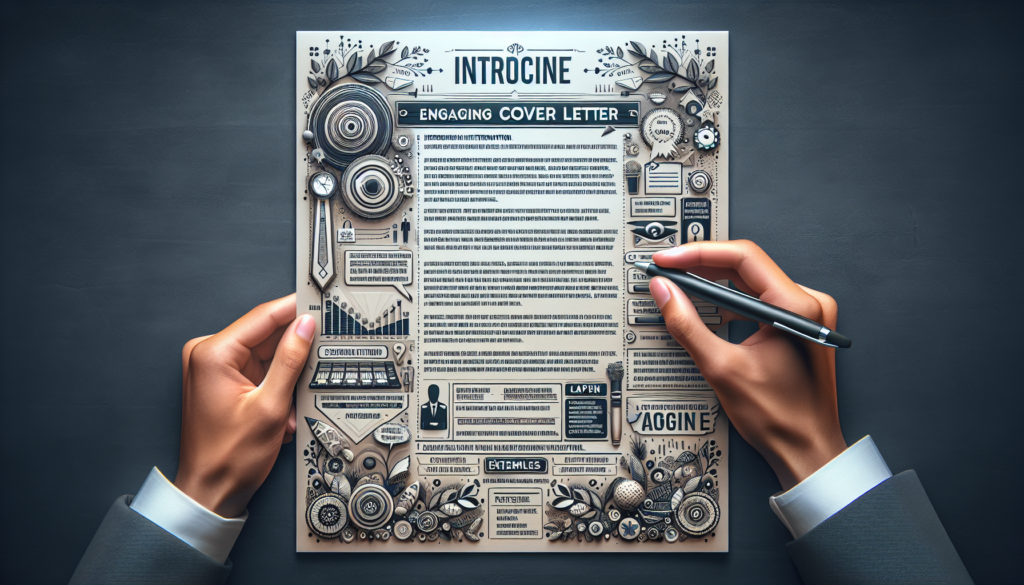Crafting a cover letter that stands out from the competition can be a daunting task, but with a few simple strategies, you can create a captivating document that grabs the attention of employers. In today’s competitive job market, a standout cover letter is crucial in making a strong first impression and securing that coveted interview. By focusing on highlighting your unique qualifications, showcasing your enthusiasm for the position, and tailoring your letter to the specific job requirements, you can increase your chances of landing your dream job. Whether you are a seasoned professional or a recent graduate, this article will provide you with valuable tips and insights on how to craft a cover letter that truly stands out.

Research and Understand the Company
Before you start writing your cover letter, it’s essential to research and understand the company you are applying to. By doing so, you can tailor your cover letter to align with the company’s mission, values, and culture.
Learn about the company’s mission and values
Begin by thoroughly analyzing the company’s website, social media platforms, and any other available resources to grasp a comprehensive understanding of their mission and values. Look for statements that outline their goals, objectives, and the impact they aim to make in their industry.
Understanding the company’s mission and values will help you craft a cover letter that speaks to their goals and demonstrates how you can contribute to them.
Research the company culture
Equip yourself with knowledge about the company culture by exploring their website’s “About Us” page and promotional materials. Pay attention to the company’s core values, employee testimonials, and any information about their team dynamics and work environment.
This research will enable you to convey your ability to fit seamlessly into their culture, reinforcing your interest in being part of their organization.
Find out who will be reading your cover letter
Whenever possible, try to find out who will be reviewing your cover letter. This information can often be found in the job description or on the company’s website. Addressing your cover letter to a specific person adds a personal touch and shows that you’ve taken the time to research and tailor your application.
Tailor Your Cover Letter to the Job
Tailoring your cover letter to the specific job you are applying for is crucial to make it stand out among other candidates. By highlighting your most relevant skills and experiences and addressing the job requirements, you can showcase your suitability for the role.
Highlight relevant skills and experiences
Carefully review the job description and identify the key skills and experiences the employer is seeking. Take note of these and emphasize them in your cover letter. Highlighting your relevant skills and experiences will demonstrate that you have the qualifications necessary to excel in the position.
Avoid merely repeating the information on your resume. Instead, use your cover letter as an opportunity to delve deeper into your accomplishments and how they align with the job requirements.
Match keywords from the job description
To make your cover letter even more tailored to the job, try to incorporate keywords from the job description. Employers often use applicant tracking systems (ATS) to scan for specific keywords, so including them can increase your chances of being noticed.
Using the same language and terminology as the job description will show that you speak the same professional language as the hiring manager and understand the requirements of the position.
Address specific job requirements
In addition to highlighting your skills and experiences, explicitly address the specific job requirements mentioned in the job description. Explain how you meet or exceed these requirements and provide examples from your past experiences that showcase your capabilities.
This tailored approach demonstrates your attention to detail and proves that you have taken the time to understand what the employer is looking for in a candidate.
Personalize Your Introduction
The introduction of your cover letter is your chance to make a strong first impression and capture the attention of the hiring manager. By addressing the hiring manager by name, starting with a captivating opening sentence, and showing enthusiasm for the role, you can create a personalized introduction that stands out.
Address the hiring manager by name
Whenever possible, address your cover letter to the hiring manager by name. This information can typically be found in the job description or by doing a quick search on the company’s website or LinkedIn. Addressing the hiring manager by name adds a personal touch and shows that you have put in the effort to learn about the person who will be reviewing your application.
If you are unable to find a name, using a general salutation such as “Dear Hiring Manager” is still appropriate. However, personalized greetings have a stronger impact.
Begin with a captivating opening sentence
Start your cover letter with a captivating opening sentence that grabs the reader’s attention. This can be a story, an interesting fact, or a statement that showcases your passion and motivation for the role.
Avoid using generic phrases or clichés in your opening sentence. Instead, be creative and engage the reader from the very beginning.
Show enthusiasm and genuine interest in the role
Throughout your introduction, convey your enthusiasm and genuine interest in the role you are applying for. Let the hiring manager know why you are excited about the opportunity and how it aligns with both your professional goals and your passion for the industry.
By demonstrating your enthusiasm, you will show the hiring manager that you have a genuine interest in the position and that you will be motivated to contribute to the company’s success.
Showcase Your Achievements
Once you have captured the hiring manager’s attention, it’s time to showcase your achievements. By quantifying your accomplishments, highlighting relevant projects or initiatives, and demonstrating the impact of your work, you can prove your value as a candidate.
Quantify your accomplishments
When describing your achievements, try to include quantifiable information whenever possible. Quantifying your accomplishments adds credibility and allows the hiring manager to understand the scope and impact of your work.
For example, instead of saying, “Managed a successful marketing campaign,” you could say, “Managed a marketing campaign that resulted in a 20% increase in sales within three months.” By providing specific numbers, you provide concrete evidence of your abilities.
Highlight relevant projects or initiatives
Focus on highlighting projects or initiatives that are directly relevant to the job you are applying for. Discuss your role in these projects, the challenges you faced, and the outcomes you achieved.
This will not only demonstrate your expertise in the specific area but also illustrate your ability to effectively manage projects and drive results.
Demonstrate the impact of your work
While discussing your achievements, make sure to highlight the impact of your work on the company or team. Did you contribute to cost savings, revenue growth, or process improvements? Explain how your efforts positively influenced the organization and how your skills and experience can benefit the prospective employer.
By showcasing the impact you have made, you provide evidence that you can deliver results and contribute to the success of the company you are applying to.

Demonstrate Your Knowledge of the Industry
To further impress the hiring manager, demonstrate your knowledge of the industry. By discussing industry trends and challenges, mentioning recent relevant news or developments, and displaying your passion for the industry, you show that you are well-informed and invested in your field.
Discuss industry trends and challenges
In your cover letter, briefly discuss some of the current trends and challenges facing the industry. This demonstrates that you are up-to-date with the latest developments and are aware of the specific challenges that companies in the industry may be facing.
By showcasing your knowledge of industry trends and challenges, you position yourself as someone who can contribute fresh perspectives and innovative solutions.
Mention recent relevant news or developments
Keep yourself informed about recent news and developments in the industry and integrate them into your cover letter when relevant. This shows that you stay engaged and are proactive in staying updated with the latest happenings in your field.
For example, if there has been a recent breakthrough or exciting development in the industry, mention it and explain how it inspires you and motivates you to contribute to the company’s success.
Display your passion for the industry
Throughout your cover letter, demonstrate your passion for the industry and the work you do. Share specific examples of how you have engaged with your profession outside of your regular job responsibilities. This can include attending industry events, participating in relevant online communities, or even pursuing additional certifications or education.
By showcasing your passion, you show the hiring manager that you are genuinely interested in the industry and that you will be motivated to excel in your role.
Address Gaps or Concerns
If you have any employment gaps or career changes that may raise concerns for the hiring manager, it’s important to address them in your cover letter. By explaining employment gaps or career changes, addressing potential red flags, and turning weaknesses into strengths, you can alleviate any concerns the hiring manager may have.
Explain employment gaps or career changes
If you have any significant gaps in your employment history or if you have changed careers, provide a brief explanation in your cover letter. Address why these changes occurred and how they have contributed to your professional growth.
By explaining the circumstances surrounding any gaps or changes, you demonstrate transparency and alleviate any potential concerns for the hiring manager.
Address potential red flags
If there are any aspects of your application that might be seen as red flags, address them head-on in your cover letter. Whether it’s a short tenure at a previous job, a lack of specific experience, or other potential concerns, provide an honest explanation and reassure the hiring manager that you have learned from those experiences and are committed to growth.
By proactively addressing potential red flags, you demonstrate your ability to take ownership of your experiences and learn from them.
Turn weaknesses into strengths
Everyone has areas for improvement, and it’s important to acknowledge and address them. If there are any weaknesses or skill gaps that may be relevant to the job, explain how you are actively working to overcome them and turn them into strengths.
This shows the hiring manager that you are self-aware, proactive, and committed to continuous learning and growth. It also demonstrates your ability to adapt and acquire new skills as needed.

Display Your Cultural Fit
Companies often value cultural fit when considering candidates, so it’s essential to showcase how well you align with the company’s values and culture. By matching your values with the company’s values, highlighting shared interests and hobbies, and emphasizing your ability to work in a diverse team, you can demonstrate your cultural fit.
Match your values with the company’s values
Research the company’s values and identify any values that resonate with you personally. In your cover letter, mention these values and explain how they align with your own principles and how they guide your work ethic and decision-making.
By showcasing your alignment with the company’s values, you demonstrate that you will be a good fit for their culture and contribute positively to the team.
Highlight shared interests and hobbies
If you have any shared interests or hobbies with the company or team, mention them in your cover letter. This can create a connection and show that you have common ground with the potential colleagues.
Shared interests and hobbies can be an excellent icebreaker during an interview and can help foster a positive and collaborative working environment.
Emphasize your ability to work in a diverse team
In today’s globalized world, working in diverse teams is increasingly important. Highlight your ability to work effectively with people from different backgrounds, cultures, and perspectives.
This can include mentioning past experiences working in diverse teams, discussing any cross-cultural communication skills you have developed, or showcasing your adaptability in different environments.
By emphasizing your ability to work in a diverse team, you demonstrate that you can contribute to a harmonious and inclusive work environment.
Keep the Cover Letter Concise
While it’s essential to provide enough information to showcase your qualifications, it’s equally important to keep your cover letter concise. By sticking to one page if possible, avoiding repeating information from your resume, and focusing on the most relevant details, you can ensure that your cover letter remains engaging and easy to read.
Stick to one page if possible
Ideally, your cover letter should be limited to one page. A concise cover letter shows that you can communicate your thoughts effectively and efficiently.
By summarizing your qualifications and experiences concisely, you respect the hiring manager’s time and demonstrate your ability to prioritize information effectively.
Avoid repeating information from the resume
Your cover letter should complement your resume, not repeat it. Avoid duplicating information that is already mentioned in your resume. Instead, focus on providing additional context, expanding on certain achievements or experiences, and highlighting the most relevant aspects that make you an excellent fit for the job.
By avoiding repetition, you keep your cover letter fresh and engaging, giving the hiring manager new insights into your qualifications and potential contributions.
Focus on the most relevant details
When crafting your cover letter, prioritize the most relevant details that directly align with the job requirements. Tailor your content to highlight the skills and experiences that make you the best candidate for the specific role.
By focusing on the most relevant details, you present a targeted argument for why you are the right fit for the position, increasing your chances of capturing the hiring manager’s attention.

Use a Professional Tone and Language
Maintaining a professional tone and using appropriate language is crucial when crafting your cover letter. By writing in a formal and respectful manner, avoiding slang and jargon, and proofreading for grammar and spelling errors, you can ensure that your cover letter is polished and high-quality.
Write in a formal and respectful manner
Your cover letter is a professional document, and it’s important to maintain a formal and respectful tone throughout. Use appropriate salutations, greetings, and language that align with the professional context.
Avoid using overly casual language or slang, as it may come across as unprofessional. Instead, demonstrate your professionalism by adopting a tone that is appropriate for the position you are applying for.
Avoid slang and jargon
While it’s important to showcase your knowledge and expertise, avoid using industry-specific jargon or acronyms that may not be familiar to the hiring manager. Keep your language clear, concise, and easily understandable.
Additionally, avoid using slang or colloquial expressions that may not be appropriate in a professional setting. Your cover letter should demonstrate your ability to articulate your thoughts clearly and effectively.
Proofread for grammar and spelling errors
Before submitting your cover letter, thoroughly proofread it for grammar and spelling errors. Pay attention to punctuation, sentence structure, and overall clarity.
Grammatical and spelling errors can detract from the professionalism of your cover letter. Take the time to review and edit your letter to ensure that it is error-free. You can also consider having someone else read it to provide a fresh perspective and catch any mistakes you may have missed.
End with a Strong Closing
As you wrap up your cover letter, end on a strong note that leaves a positive impression on the hiring manager. By expressing gratitude and appreciation, reiterating your interest and qualifications, and including contact information and a call to action, you can conclude your cover letter effectively.
Express gratitude and appreciation
In your closing paragraph, express gratitude for the opportunity to apply and appreciation for the hiring manager’s time and consideration. Thank them for reviewing your application and considering you for the role.
By expressing gratitude, you leave a positive impression and show that you value the opportunity to be a part of their organization.
Reiterate your interest and qualifications
Reiterate your interest in the position and your qualifications that make you a strong candidate. Summarize your key skills, experiences, and achievements that align with the job requirements.
This serves as a final reminder of why you are the right fit for the role and keeps your qualifications fresh in the hiring manager’s mind as they make their decision.
Include contact information and a call to action
Finally, include your contact information and a call to action. Provide your phone number and email address, making it easy for the hiring manager to reach out to you.
Additionally, include a call to action, encouraging the hiring manager to contact you for further discussion or to schedule an interview. This demonstrates your proactive approach and eagerness to move forward in the hiring process.
By following these guidelines and tailoring your cover letter to the specific job and company, you can craft a comprehensive and compelling cover letter that will help you stand out from other candidates and increase your chances of securing an interview. Remember to be genuine, enthusiastic, and professional throughout the entire letter. Good luck with your application!
